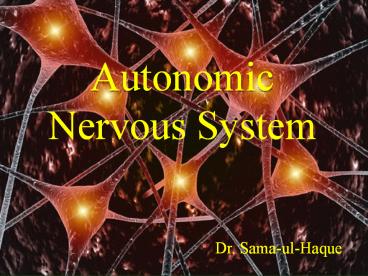Autonomic - PowerPoint PPT Presentation
Title: Autonomic
1
Autonomic Nervous System
Dr. Sama-ul-Haque
2
Objectives
- Define autonomic nervous system.
- Describe sympathetic and parasympathetic nervous
system. - Enumerate the functions of sympathetic and
parasympathetic nervous system.
3
The Autonomic Nervous System
- ANS is the subdivision of the peripheral nervous
system that regulates body activities that are
generally not under conscious control - Visceral motor innervates non-skeletal
(non-somatic) muscles - Composed of a special group of neurons serving
- Cardiac muscle (the heart)
- Smooth muscle (walls of viscera and blood
vessels) - Internal organs
- Skin
4
- Basic anatomical difference between the motor
pathways of the voluntary somatic nervous system
(to skeletal muscles) and those of the autonomic
nervous system - Somatic division
- Cell bodies of motor neurons reside in CNS (brain
or spinal cord) - Their axons (as nerves) extend all the way to
their skeletal muscles. - Autonomic system chains of two motor neurons
- 1st preganglionic neuron (in brain or cord)
- 2nd gangionic neuron (cell body in ganglion
outside CNS)
5
- Axon of 1st (preganglionic) neuron leaves CNS to
synapse with the 2nd (ganglionic) neuron. - Axon of 2nd (ganglionic) neuron extends to the
organ it serves
Diagram contrasts somatic (lower) and autonomic
autonomic
this dorsal root ganglion is sensory
somatic
6
Divisions of the autonomic nervous system
- Parasympathetic division
- Sympathetic division
- Serve most of the same organs but cause opposing
or antagonistic effects
Parasympathetic routine maintenance rest
digest Sympathetic mobilization increased
metabolism fight, flight or fright
7
(No Transcript)
8
(No Transcript)
9
Where they come from
Sympathetic Thoracolumbar T1 to L2
Parasympathetic Craniosacral
10
Paravertebral Ganglionic chain or Sympathetic
Trunk
11
Paravertebral Ganglionic chain
12
Spinal Nerve
13
Sympathetic nerve
14
(No Transcript)
15
(No Transcript)
16
Sympathetic Nervous system
17
Parasympathetic Nervous system
18
(No Transcript)
19
(No Transcript)
20
Functions of Sympathetic Nervous System
- Increased Heart Rate
- Increased Blood Pressure
- Pupil Dilation
- Decreased Urination
- Increased Sweating
- Bronchial Dilation
- Decreased Salivation
21
Functions of Parasympathetic Nervous System
- Decreased Heart Rate
- Decreased Blood Pressure
- Pupil Constriction
- Increased Urination
- Decreased Sweating
- Bronchial Constriction
- Increased Salivation
22
Thank You































